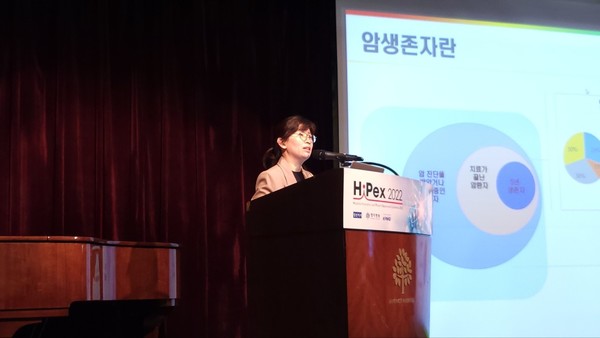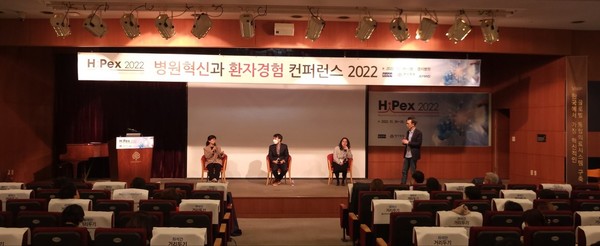“Many people don't take pictures after a cancer diagnosis because they are afraid of changed appearance or such pictures being used as a funeral portrait. However, at the event conducted by the Cancer Survivor Integrated Support Center at the National Cancer Center (NCC), some cancer survivors had their picture taken, showing a small change to return to society.”
So said Jung So-youn, head of the support center, during the HiPex (Hospital Innovation and Patient Experience Conference) 2022 at Myongji Hospital in Goyang, Gyeonggi Province, organized by The Korean Doctors’ Weekly, the sister paper of Korea Biomedical Review, and KPMG Korea, on Thursday.

Jung stressed that hospitals should change cancer management services for survivors. Existing cancer care services focus on diagnosis and treatment, but they should be expanded to help survivors return to society after treatment.
As the cancer survival rate increases, managing aftereffects on survivors for their return to society after treatment is becoming important.
According to a five-year cancer survival rate survey conducted by the Ministry of Health and Welfare and the National Cancer Center, survival rates increased across cancer from 1993 to 2019. For instance, the survival rate of thyroid cancer was 94.5 percent between 1993 and 1995 but increased to 100 percent between 2015 and 2019. During the same period, the breast cancer survival rate rose 14.4 percentage points to 93.6 percent.
"Cancer survivors visit an emergency room for fear of recurrence if they have pain. If they experience (such a situation) several times, they can't sleep and fall into a depressed mood,” Jung said. “The combination of various mental, physical, and social difficulties appears after cancer treatment.”
Stressing that cancer should be managed with the aim of returning cancer survivors to society healthily, Jung pointed out that medical professionals should not only treat them with accurate information but also offer opportunities for cancer survivors to come out and enter into society.
Jung then introduced her experience leading cancer survivors to return to society, using an event held at the Cancer Survivor Integrated Support Center as an example.
The Ministry of Health and Welfare started a pilot project for the integrated support of cancer survivors in July 2017. In addition to NCC, the ministry selected 13 medical institutions in the country, including Gachon University Gil Hospital and Chungnam National University Hospital, to set up and operate the regional chapters of the support center.
According to Jung, the integrated support centers are designed to promote the health of cancer survivors and their families and help them return to society, providing services for their physical and mental health, information education, and social and economic matters.
“Private businesses also cooperate for survivor support. For example, a global medical company took pictures of cancer survivors and their families and taught them photographing skills,” she said. “Some survivors didn’t take pictures for fear of changed appearances or using them as funeral portraits. However, small changes occurred for their return to society during the event.”

Han Yun-dae, a colorectal anal surgeon at Severance Hospital, analyzed the cause of difficulty returning to society after treatment from a surgeon's perspective.
“Surgeons’ weapon is surgery, so they seek to cure it completely through surgery. As a result, they are less interested in patients who overcame cancer after treatment," Professor Han said. “For instance, breast cancer patients’ arms could be swollen due to lymphedema after surgery, and in the case of colorectal cancer, cured patients might carry an intestinal sac."
Because cancer surgery causes bodily structural changes and physical aftereffects, it is necessary to manage complications and aftereffects and induce changes in social awareness in an integrated manner, Han added.
“In cancer treatment, local communities and familial management should be interconnected. More people should think about it,” he said. “It is necessary to set appropriate fees, establish guidelines for treatment, and solve the problem of whereabouts of responsibility concerning cancer recurrence.”
Professor Park Hye-yun of the Neuropsychiatry Department at Seoul National University Hospital pointed out that cancer survivors experience difficulty psychologically and socially after treatment, stressing that it’s important to think they live a new life by overcoming cancer.
“Patients want a return to normal life the most. However, they suffer from fatigue, pain, and fever due to chemotherapy and anti-hormones, realizing the reality is different,” she said. “They can narrow the gap only by remaking a post-treatment life instead of trying to go back to before the outbreak of cancer.”
Professor Park emphasized that survivors need proper physical activity, healthy eating, and regular sleep while receiving social support from families, friends, and acquaintances.

